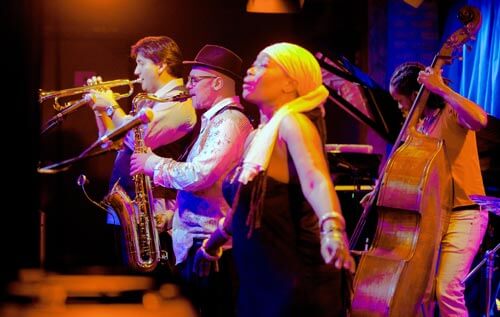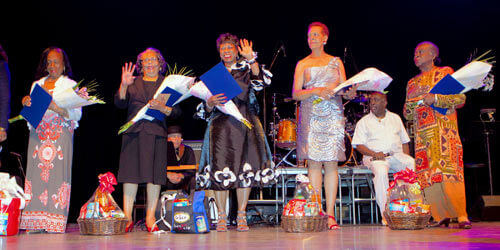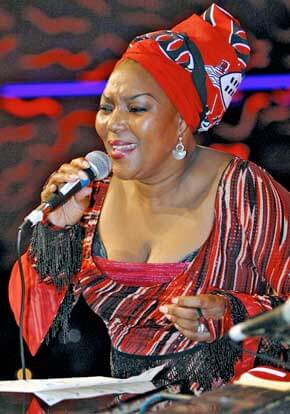When jazz saxophonist Jacques Schwarz-Bart lifts his horn to his lips, he is calling the spirits. His current project, ‘Jazz Racine Haiti,’ explores the depths of the source of Jazz and Haitian Voodoo. The two worlds rarely overlap, heightening the anticipation at Sub Culture, before the album’s U.S. unveiling in March.
The a capella voice of Rozna Zila broke the silence in the noho music space as the band assembled on the darkened stage. Greeting Legba and the spirits with ‘Ago eh’ (open the gate) before being joined by percussionist Bonga, and Jacques on tenor sax. ‘Ago eh’ merged into a traditional song ‘Badé Zilé’ built around a ritual chant. Joined by the full band it opened with a theme introduced by pianist Milan Milanovic and taken up softly by Jacques on tenor sax and Mike Rodriguez on trumpet, before Rozna returned.
The trumpet/sax interaction is a point the music came back to over the course of the evening. “I have been trying to develop situations where you have extended collective blowing,” Jacques told Caribbean Life after the show “like on the tag on ‘Vaudou Zepole’ (a traditional piece from the album). Playing over the progressions (With trumpet player Mike Rodriguez), part of it is dialogue, part is harmony, part is rhythmical.”
Music from ‘Jazz Racine Haiti’ fall into two categories interpretations of traditionals based on voodoo chants and original compositions dedicated to a particular spirit.
‘Sept Fé’ dedicated to Oku, a turbulent spirit, falls into the later category. The song in 7/4 meter careened back and forth between pianist Milan Milanovic and drummer Ari Hoenig, heightening, chaotic nature of the spirit answered by a solo from Jacques, he rocked back and forth while the intensity built and he distilled notes down to single repeated phrase.
Kouzin is an arrangement of ritual chant calling to Kouzen Zaka, the god of nature. It makes use of silence, a pause that is longer that the motif itself. The silence is an integral part of the voodoo ceremony, calling out and letting the universe respond. In this context Jacques says “opening the door for the energy to hit you back.”
Soon after arriving in New York, 17 years ago, percussionist Bonga and Jacques would find themselves playing together and talking about jazz and voodoo music. The idea for this project was born in those conversations. Jacques was born in Guadeloupe and his first musical experience was on the Gwoka drum. Bonga is a a voodoo priest from Port au Prince who was playing in Walkers house band. While voodoo was the origin of jazz, they discovered that jazz guys had no knowledge of voodoo, and voodoo musicians had no idea of composition. The few Haitian jazz musicians at the time were not interested in including ritual chants in their music.
In a sense, Mr. Schwarz-Bart is using the language of jazz, uniting what is implicit (the acknowledgement of past masters), in order to shine a light of understanding on what is explicit in the ritual music. “Voodoo music is so melodic, intricate and majestic it can only be compared to opera, it should be called Afro Caribbean classical music.”
Jazz Racine Haiti will next perform two shows at La Mama in the east village May 1 and 2 before heading to St. Lucia for a jazz festival show May 4, in the south at Rudy John beach.
The band included Rozna Zila, vocals; Gaston Jean Baptiste “Bonga” percussion; Milan Milanovic, piano; Mike Rodriguez, trumpet; Jacques Schwarz-Bart, tenor sax; Ari Hoenig, drums; Ben Williams, bass; and Sara Charles guest vocalist.

Photo by William Farrington
J


























